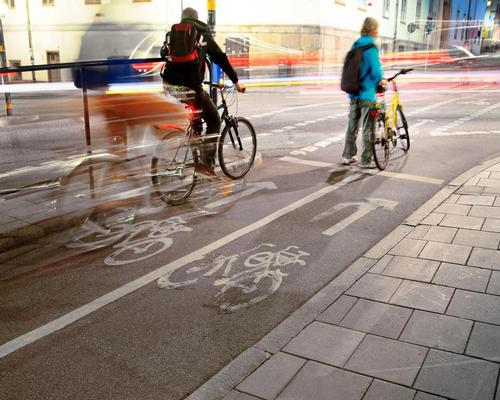12 Feb 2020
Manchester's cycling and walking network 'could become national blueprint'
BY Tom Walker

The Bee Network initiative, a joined-up cycling and walking network planned for Greater Manchester, could provide a blueprint for improving the nation's health, while also reducing congestion and air pollution.
That is the message from a report outlining the benefits of the revolutionary network, which would create 1,800 miles of protected space for cycling and walking throughout the city and its surrounding areas.
The Bee Network would be the longest planned walking and cycling network in the UK and would connect every neighbourhood of Greater Manchester, providing 435 miles of main road corridors and town centre streets with protected links, junctions and public realm improvements.
Commissioned by Transport for Greater Manchester, the Greater Manchester Combined Authority and the mayor of Greater Manchester, Andy Burnham, the Change a region to change a nation report states that the Bee Network could increase journeys on foot (or by bike) by 2.5m a day, cut some journey times by 50 per cent and save the NHS £6.73bn by improving people’s health.
According to the report, the network will result in a 350 per cent increase in daily cycling trips over the next 10 years, a 33 per cent increase in daily walking trips and up to 130,000 fewer daily car journeys.
One of the driving forces behind the plan is former Olympic champion Chris Boardman, who is now the Greater Manchester region’s cycling and walking commissioner.
"It will take at least 10 years and £1.5bn to deliver the whole Bee Network and supporting services," Bordman writes in the report.
"This investment will be essential to ensure that walking and cycling play a central role in delivering Greater Manchester’s vision for at least 50 per cent of all trips to be made by sustainable modes of transport by 2040 (which equates to at least 1 million more sustainable trips on our network every day).
"The benefits of this switch will be enormous."
He added that the city would now need central government support to fund the programme.
"Greater Manchester courageously allocated the majority of its Transforming Cities Fund to drive this transport culture change; however this equates to just 10 per cent of what is needed.
"Despite this sizeable commitment, it is not enough and remains a time-limited fund. With local authority finances at breaking point, it is impossible to invest in the skills and training to deliver such a programme efficiently.
"Greater Manchester leaders have shown their desire, vision and courage; they now need the government to back them, by committing the remaining funds to enable the region to realise the dream.
"The evidence outlined in the report demonstrates that it would not make economic sense to do otherwise.
"This investment would return a benefit of at least four to one, returning £6bn in public benefits."
Andy Burnham added: "We have a world-class plan and we know how to deliver it, but we cannot do it alone. We need the government to back us with sustained funding over the next ten years to enable us to complete the Bee Network.
"If they do so they will be helping create a model that can be replicated across the rest of the country.
"Put simply, if they help us change our city-region, we can help change the country."
Developed in partnership by the 10 Greater Manchester local authorities and Boardman, the Bee Network plan also sets out plans for 17 “filtered neighbourhoods” – areas that prioritise the movement of people over the movement of motor vehicles.
The filtered districts will also include more public spaces to sit, play and socialise.
• To download and read the full Change a Region to Change a Nation report, click here.
Close Window